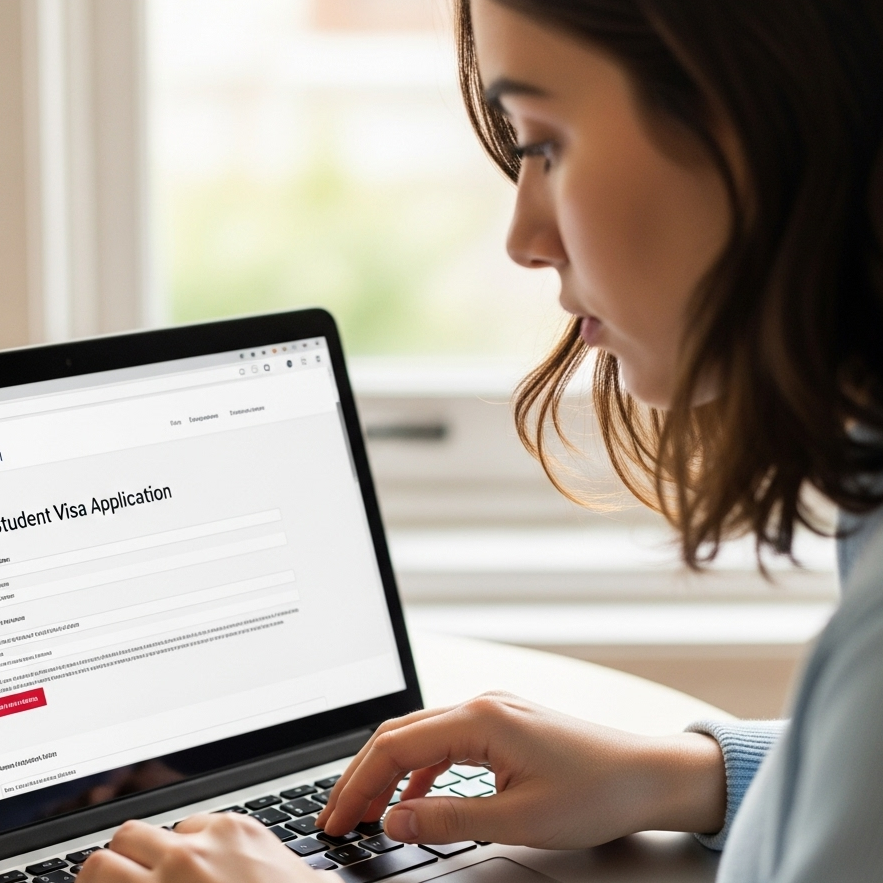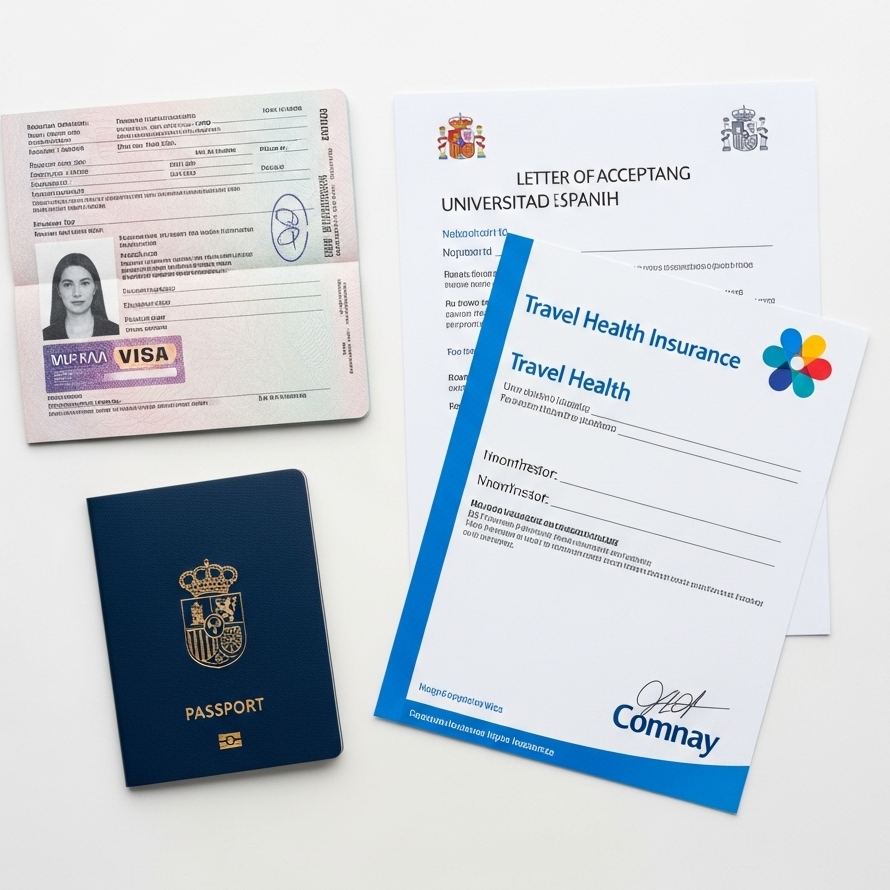Dreaming of paella, Picasso, and pursuing your education under the warm Spanish sun? You’re in the right place. The process of securing your academic future in Spain has seen some significant updates, and our guide to the Spain Study Visa New Policy Changes Now Implemented from June 2025 Onwards is here to walk you through every step. These changes, part of a broader immigration reform, are designed to make studying in Spain more straightforward for some, while setting new parameters for others. We’ll break down exactly what this means for you, ensuring you feel confident and prepared for your application.

Spain Study Visa New Policy
For those who love a quick overview, here are the most crucial updates to the Spanish student visa process effective from May 20, 2025.
| Key Change | What It Means for You | Source |
| Work Rights for Students | Higher education students (Bachelor’s, Master’s, PhD) can now work up to 30 hours per week. | Jobbatical |
| New Application Process | Most visa applications must now be submitted through designated BLS International centres in your home country. | DAAD Scholarship |
| Extended Visa Validity | For university students, the residence permit now covers the entire duration of your studies, ending the need for yearly renewals. | ProSpainConsulting |
| Stricter Rules for Language Courses | Student visas for non-degree courses (like language programs) can only be renewed once and cannot be converted into a work permit. | TEFL Iberia |
Navigating visa changes can feel daunting, but these new policies ultimately bring more clarity and significant benefits, especially for university-bound students. The key to a stress-free experience is preparation. Start gathering your documents early, double-check the specific requirements of the Spanish Consulate in your region, and don’t hesitate to reach out to your chosen university for guidance.
Spain is not just offering an education; it’s offering an experience. With these new rules, the opportunity to study, work, and immerse yourself in one of Europe’s most vibrant cultures is more accessible than ever.
Understanding the New Landscape: What’s Really Changed?
Spain has long been a beloved destination for international students, and the government’s latest reforms aim to enhance its appeal. The Royal Decree 1155/2024, which came into effect on May 20, 2025, has reshaped the student visa framework. The goal is twofold: to attract top talent to its universities and to streamline the administrative process.
In my experience advising students, the biggest source of anxiety is often uncertainty. This reform, while introducing new rules, also brings a great deal of clarity to the process. Let’s dive into the specifics.

The New Star of the Show: Work Rights for University Students
Perhaps the most exciting update is the ability for higher education students to work. If you are enrolled in a Bachelor’s, Master’s, or PhD program, you are now permitted to take on part-time employment for up to 30 hours per week. This is a game-changer for a few key reasons:
- Financial Support: Earning an income can significantly ease the financial burden of living abroad.
- Professional Experience: Gaining work experience in a Spanish company is an invaluable addition to your CV.
- Cultural Immersion: Working alongside locals is one of the fastest ways to improve your language skills and integrate into the culture.
This move aligns Spain with other popular study destinations and signals a strong welcome to the international student community.
Here’s a relevant announcement from the Spanish authorities on attracting international talent.
A Shift in Application: Applying from Your Home Country
A significant procedural change is the mandate for most students to apply for their visa from the Spanish Consulate in their country of residence. Previously, some students could enter Spain on a tourist visa and then apply for their student stay.
This is no longer the case for many, particularly those enrolling in non-accredited or short-term language courses. All applications are now managed by BLS International, the official external service provider for Spanish visas in many countries.
What this means for you:
- Plan Ahead: You must start your visa application process well in advance of your intended travel date.
- Official Channels: Use only the official BLS International website for your region to book appointments and find checklists.
- No In-Country Applications (for some): If you are enrolling in a TEFL or other non-university program, you must secure your visa before you travel to Spain.
Navigating the Spain Study Visa New Policy for Different Courses
The new regulations create a clear distinction between students in higher education and those pursuing other types of studies, such as language courses.
For University and Higher Education Students: A Smoother Path
If you’ve been accepted into a Spanish university, the path has become more straightforward. The initial student residence permit you receive will be valid for the entire duration of your academic program. This is a fantastic development that eliminates the bureaucratic headache of annual renewals, allowing you to focus purely on your studies.
For Language and Non-Degree Students: New Considerations
The rules for students enrolling in language courses have become more restrictive. Here’s what you need to know:
- Limited Stay: You can only renew your student visa for a language course once, meaning the maximum period of study is now effectively two years.
- No Switch to Work Permit: After completing your language studies, you can no longer modify your student stay into a work permit from within Spain.
- Language Proficiency for Renewal: To renew your visa for a second year of language study, you will need to prove your progress by passing an official Spanish language exam like the DELE or SIELE.
These changes are intended to ensure that the student visa route is used for its intended academic purpose.
Your Application Checklist: Documents and Details
A successful application is all about the details. While the exact requirements can vary slightly by consulate, here is a comprehensive list of documents you will almost certainly need.
- Visa Application Form: Completed and signed.
- Passport: Valid for your entire intended stay with at least two blank pages.
- Letter of Acceptance: An official letter from your Spanish educational institution. It must be a full-time program (minimum 20 hours per week).
- Proof of Financial Means: You must prove you can support yourself. The minimum is 100% of Spain’s IPREM (Indicador Público de Renta de Efectos Múltiples), which is approximately €600 per month. This can be shown through:
- Bank statements from the last six months.
- A scholarship letter.
- A notarized letter of sponsorship from your parents or a legal guardian.
- Health Insurance: You need a private health insurance policy from a company authorized to operate in Spain. It must provide a minimum coverage of €30,000 and have no co-payments or deductibles. Standard travel insurance is not sufficient.
- Medical Certificate: A recent certificate stating you are free from any diseases that could pose a public health risk, as per International Health Regulations.
- Criminal Record Check: For stays longer than 180 days, you’ll need a criminal record certificate from any country you’ve lived in for the past five years, apostilled and translated into Spanish.
- Proof of Accommodation: Evidence of where you will be living, at least for the initial period of your stay.

FAQs
Q1: Can I still apply for a student visa from within Spain?
For most non-EU citizens, especially those enrolling in non-degree programs, the new policy requires you to apply from the Spanish Consulate in your home country before you travel.
Q2: How much money do I need to show for the Spanish student visa?
You must demonstrate access to 100% of Spain’s monthly IPREM, which is approximately €600 per month for the duration of your stay. If you are bringing dependents, you’ll need to show additional funds.
Q3: What are the new work rights for students in Spain?
If you are enrolled in a higher education program (like a Bachelor’s or Master’s), you can now legally work up to 30 hours per week. This right does not extend to students on visas for language courses.
Q4: Is my travel insurance enough for the visa application?
No. You must obtain a specific private health insurance policy from an insurer authorized in Spain. The policy must offer full coverage within Spain with no co-payments or deductibles.
Q5: How long is the new student visa valid for?
For higher education students, your initial residence permit will be valid for the entire length of your program. For other courses, it is typically valid for one year, with the possibility of a single renewal for language studies.










